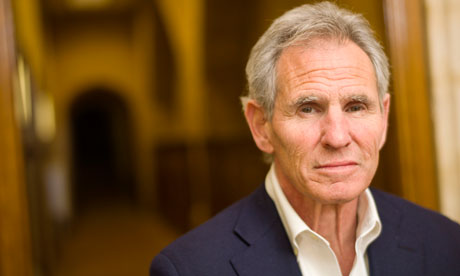The blurb read as follows:
"Jon Kabat-Zinn is widely credited as the man who brought Zen Buddhism to the masses. Now he's bringing it to Downing Street"

Here are some of the key quotes:
"As a scientist, Kabat-Zinn knew he needed evidence; anecdotes and testimony were not going to be enough to persuade the American health establishment. "I wrote up the chronic pain results first because they were astonishing." Since then, a steady stream of academic papers, books and, more recently, randomised control trials, have helped pave the way for hundreds of MBSR programmes in hospitals and medical centres across the US.
Kabat-Zinn's work has spawned a cluster of different applications of mindfulness training, including for addiction, the elderly and parenting. In the past couple of decades, Kabat-Zinn has collaborated with psychologists in the UK who have adapted his work for Mindfulness Based Cognitive Therapy (MBCT), which has won recognition from the National Institute for Health and Care Excellence (Nice), as a treatment for depression.
All of which explains why our interview is happening in Westminster, where Kabat-Zinn has a string of meetings with senior politicians before he heads to Downing Street for a session with policy advisers. There are good reasons for the policymakers to be listening closely, as Kabat-Zinn and his colleagues have a compelling proposition: mindfulness has unlimited applicability to almost every healthcare issue we now face – and it's cheap.
[...]
The UK has huge challenges in healthcare, with an explosion in mental illness and an ageing population, he points out, adding that mindfulness is relevant to the debate about how to instil compassion and attentive care in healthcare workers to avoid a repeat of the Mid Staffordshire scandal. Mindfulness training inspires compassion, he argues. Just the act of being in the moment and paying attention to that moment allows the innate compassion within us all to emerge.
"It's all about training what you pay attention to," he says, admitting that this goes against the grain of a culture that trains us to privilege thinking and which offers endless opportunities for constant distraction from the present moment. "It's common sense. It's not about cures, it's about over time developing a different relationship with one's experiences, whether that's anxiety, pain, stress or depression. We know that changes the shape of the brain, it affects the behaviour of cells."
[...]
He now believes that mindfulness is on a steep adoption curve. Given the benefits of mental clarity, insight and creativity that practitioners claim, the interest from corporations is wellestablished, particularly in Silicon Valley, where Kabat-Zinn is a regular speaker. Even the US military has adopted a version of mindfulness for training soldiers.
None of these applications faze Kabat-Zinn, although they are far from the ethos of his own work. Even if mindfulness is used by the banker or the soldier to improve their professional skills, he says, it will also nurture the innate compassion of their humanity.
"It is what makes us human, what distinguishes us from other animals. We can be aware of being aware.""
No comments:
Post a Comment